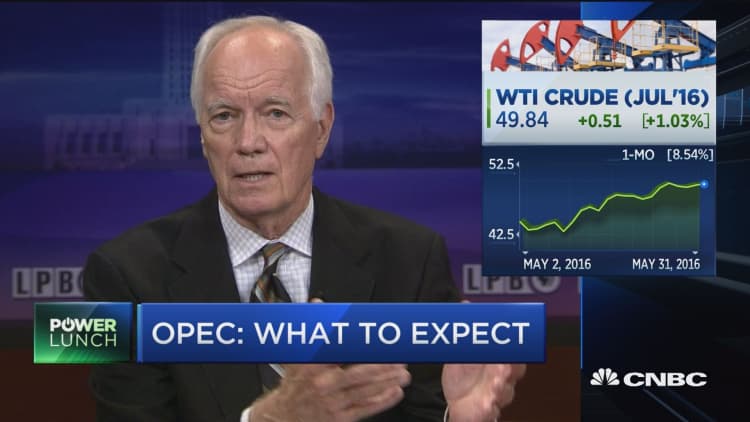
If OPEC decides at its meeting this week to keep pumping oil, there may be a slight pullback in crude prices, but that will probably be a temporary move, energy analyst Neal Dingmann said Tuesday.
"Overall, we think that … production is finally going to start to go down [and] prices are going to continue this upward trend," he said in an interview with CNBC's "Power Lunch."
In fact, Dingmann, managing director of energy research at SunTrust Robinson Humphrey, believes oil should be in the $50s this year and has the potential to hit $60 or more next year. It will specifically be driven by falling world conventional production, which is currently 40 percent of total daily production, he said.
While oil is heading for the fourth straight monthly gain, prices fell Tuesday after United Arab Emirates Oil Minister Suhail bin Mohammed al-Mazroui said he was happy with the oil market, noting that prices had been correcting higher.
U.S. West Texas Intermediate (WTI) settled 0.47 percent lower, or 23 cents, at $49.10 a barrel. were down 9 cents at $49.67.
The member nations of the Organization of the Petroleum Exporting Countries are set to meet Thursday in Vienna. Iran is expected to supply 5 million barrels of extra crude to its international oil company partners in June. Saudi Arabia, the world's top crude exporter, and fellow OPEC producers Kuwait, Iran and the United Arab Emirates, also plan to raise supplies in the third quarter.
Economic consultant Loren Scott, president of Loren C. Scott & Associates, said it will be hard to forecast what will come out of the meeting.
While Saudi Arabia boosted production in an effort to hurt U.S. shale producers, some other OPEC members are not necessarily on board with Saudi Arabia's thinking, he said.
"The problem here is these other countries do not have a big stash of cash over here like the Saudis," he told "Power Lunch."
However, Saudi Arabia's cash reserve of about $730 billion has declined by at least $100 billion, and it has had to cut its internal spending, which is causing internal problems, he said.
"They are going in there thinking, 'How much longer can we keep this up versus have the people in the shale play— and more importantly the people that lend money to the people in the shale play — learned their lesson,'" he said.
How to play it
SunTrust's Dingmann would play U.S. independent names in a rising oil environment.
"They're the ones who can turn on their spigots the quickest. They're in some of the best plays" like the Bakken and Permian, he said.
Specifically, he likes Parsley Energy, Diamondback Energy, Pioneer Natural Resources and Concho Resources in the Permian and Whiting Petroleum and Continental Resources in the Bakken.
—CNBC's Jackie O'Sullivan and Reuters contributed to this report.
Disclosures: CXO, FANG, WLL, PE are investment banking clients of SunTrust. An affiliate of SunTrust Robinson Humphrey has received compensation for non-securities services from CXO, FANG, WLL within the last 12 months.





